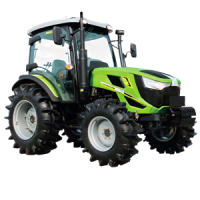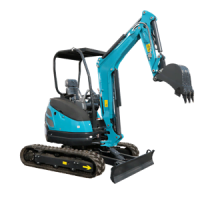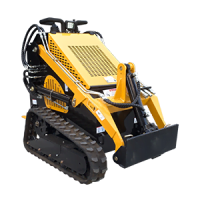Hey there, eco-conscious explorers! Get ready to dive into a world where size doesn’t determine impact. Mini excavators, those compact powerhouses of the construction site, are making waves in the environmental realm. If you thought going green was reserved for electric cars and solar panels, think again. These pint-sized heroes are showing us that small changes can create significant ripples. So, put on your eco-hats, and let’s uncover how mini excavators are turning construction sites into sustainability sanctuaries.
Table of Contents
- Introduction
- The Carbon Footprint Conundrum: Tackling Emissions
- Fuel Efficiency Fantasia: Sipping, Not Guzzling
- Noise Pollution Solution: Quieting the Chaos
- Less Is More: Reduced Material and Energy Consumption
- Site Restoration Stewards: Minimal Disruption, Maximum Restoration
- Space Savers: Navigating Tight Spaces with Grace
- Responsible Resource Management: Smaller Footprint, Bigger Impact
- Economic Ecosystem: Saving Costs and Resources
- Conclusion
- FAQ
1. Introduction
 When we think of construction, we often picture heavy machinery churning out noise, emissions, and a sizable ecological footprint. But behold, the era of mini excavators is upon us, and they’re rewriting the construction narrative. These machines might be compact, but their environmental impact is colossal. From emissions reduction to resource conservation, they’re proving that small size can lead to big change.
When we think of construction, we often picture heavy machinery churning out noise, emissions, and a sizable ecological footprint. But behold, the era of mini excavators is upon us, and they’re rewriting the construction narrative. These machines might be compact, but their environmental impact is colossal. From emissions reduction to resource conservation, they’re proving that small size can lead to big change.
2. The Carbon Footprint Conundrum: Tackling Emissions
Construction machinery and carbon emissions? They’re often seen as inseparable partners. But here’s where mini excavators break the mold. With advanced engines and emissions control systems, these machines are emitting significantly fewer pollutants. It’s like witnessing a magician make pollutants disappear from the construction stage.
3. Fuel Efficiency Fantasia: Sipping, Not Guzzling
Fuel efficiency is more than just bragging rights; it’s an environmental anthem. Mini excavators, with their compact engines and smart designs, are sipping fuel like responsible tea drinkers. Their thirst for fuel is significantly lower compared to their larger counterparts. It’s like watching a marathon runner cruise effortlessly while their competitors huff and puff.
4. Noise Pollution Solution: Quieting the Chaos
Construction sites are notorious for their symphonies of noise. But imagine a construction site where the roar of engines is replaced by the soothing hum of progress. Mini excavators are engineered with noise reduction in mind, making them not just operators of change but also orchestrators of serenity.
5. Less Is More: Reduced Material and Energy Consumption
The law of conservation of energy tells us that energy cannot be created or destroyed, only transferred or converted. Mini excavators embody this law by conserving energy. Their smaller size translates to lower energy demands for operation, which in turn reduces the overall consumption of materials and resources. It’s like watching a thrifty chef create a gourmet meal using only a handful of ingredients.
6. Site Restoration Stewards: Minimal Disruption, Maximum Restoration
Construction might transform landscapes temporarily, but what if we told you that mini excavators are also site restoration stewards? Their precision and maneuverability mean less disruption during construction, leading to quicker site restoration. It’s like witnessing a master gardener plant seeds in a way that accelerates the growth of a lush oasis.
7. Space Savers: Navigating Tight Spaces with Grace
Navigating a crowded room without bumping into furniture is an art. Mini excavators, with their compact size and agile movements, are the maestros of this art on the construction stage. They can maneuver through tight spaces with grace, minimizing the need for site alteration and preserving the natural layout of the land.
8. Responsible Resource Management: Smaller Footprint, Bigger Impact
 Every construction project leaves a footprint, but it’s the size that matters. Mini excavators, with their smaller footprint, are leaving a gentler mark on the environment. They’re champions of responsible resource management, showing that it’s possible to construct without leaving behind an ecological scar.
Every construction project leaves a footprint, but it’s the size that matters. Mini excavators, with their smaller footprint, are leaving a gentler mark on the environment. They’re champions of responsible resource management, showing that it’s possible to construct without leaving behind an ecological scar.
9. Economic Ecosystem: Saving Costs and Resources
Being eco-friendly isn’t just about hugging trees; it’s also about nurturing your financial bottom line. Mini excavators not only save fuel but also reduce operating costs. With fewer emissions and lower fuel consumption, they’re contributing to a healthier economic ecosystem while treading lightly on the planet.
10. Conclusion
Mini excavators might be small in stature, but their impact on the environment is immeasurable. These machines are rewriting the construction script, proving that innovation and sustainability can go hand in hand. From emissions reduction to resource conservation, mini excavators are inspiring us to rethink our construction practices and embrace a greener future.
11. FAQ
Q1: Are mini excavators as powerful as larger ones?
A1: While mini excavators might have slightly lower horsepower, their efficiency and maneuverability make them highly capable for a wide range of tasks.
Q2: How do mini excavators contribute to emissions reduction?
A2: Mini excavators are equipped with advanced engines and emissions control systems that significantly reduce the emission of pollutants.
Q3: Can mini excavators handle large-scale construction projects?
A3: Yes, mini excavators can handle a variety of construction tasks, from small-scale projects to larger endeavors.
Q4: Are mini excavators more expensive to operate due to advanced technology?
A4: While initial costs might be higher due to advanced technology, the long-term benefits, including reduced fuel consumption and maintenance costs, often outweigh the initial investment.
Q5: Can mini excavators replace larger construction equipment entirely?
A5: While mini excavators are versatile and efficient, some projects may still require the capabilities of larger





-1.png)